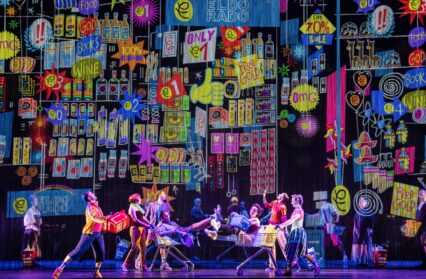Gary Raymond takes in a week of adaptations from “problematic” source material, with WNO’s production of Leonard Bernstein’s difficult Candide, and Rhiannon Boyle‘s radio adaptation of Caradog Prichard’s dream-like novella One Moonlit Night (Un nos ola Leuad).
‘tis the season to be tackling tricky source material, apparently. WNO’s 2023 programme has its share of crowd-pleasing classics, as well as revivals of more modern curios (La Traviata is being paired with Golijov’s 2003 debut opera Ainadamar later this year), but there must have been a few eyebrows raised in respectful anticipation at the news of a production of Leonard Bernstein’s 1955 less-than-adored Candide. A bold choice, and, given WNO’s track record at rising to creative challenges, an exciting one. Candide, rather like Don Quixote, has never been truly successfully adapted for another form, and the reason for both is the same: they are not inherently “dramatic” works. The character of Candide, like Quixote, goes on no developmental journey – at least in the way two thousand years of western literature dictates protagonists must do. For Cervantes, the point is that everything changes around his main man whereas Quixote himself remains impervious to change; but that hasn’t helped the numerous auteurs who have tried to put the Spanish classic on stage and screen. Candide, likewise, is an amiable wally at the beginning, and for all of his travails (and, it must be said, opportunities to evolve emotionally) he gets nowhere. This is because Voltaire, like Cervantes, had a broader argument in mind than the audience expectations of the character arc. Candide is a work of philosophy and of satire, and so the framework an adaptor might cling to is fragile at best.
Similarly difficult with Candide is that it defies honest reproduction because it is, in itself, a piss-take of dramatic logic. The narrative is a swirl of global locations, great wars and swathing famines and devastating earthquakes hang lightly while classroom debates hang heavy, characters come back from the dead with no attempt at an explanation, just as characters who have bizarre physical anomalies avoid backstory. Candide himself is ruthlessly underdone as a lead character, as are many of the others. With Candide, Voltaire was famously reacting to (and lampooning) Leibniz’s up-beat doctrine (“this is the best of all possible worlds”) which was coming in for renewed critique in the wake of the devastating 1755 earthquake of Lisbon; but he was also throwing out the necessities of believability as well as the responsibilities of the author of fiction — he was saying in essence that if you believe that bullshit then all bets are off. And so the story leaps from improbable twist to unlikely development with a wide grin and knowing tip of the hat and hike of the skirt.
And James Bonas’s WNO production goes the only direction it could, which is to follow Voltaire and go all in. Bonas clearly understands satire, what it is, what it is for, its history and its modern malaise (which, incidentally, was why Bernstein was so attracted to Candide in the first place). Bonas’s engagement with the form is evident in every decision presented on stage, most powerfully in Grégoire Pont’s lively and hilarious animations that dominate the staging, projected onto a gargantuan chainmail curtain. Interacting sometimes with a Pythonesque divinity, sometimes with a clever subtlety, in the real action, it is the perfect vehicle for the absurdity of the satire, and it moves the action along from clunky plot point to clunky plot point. The style is the answer to the problem of form.
As is Nathalie Pallandre’s anachronistic costume design, dominated by the influence of Vivienne Westwood not because Westwood’s shabby regency chic must be commonly irresistible to a designer, but because here it is the perfect marriage of style and substance. In fact, squint and you might want to imagine Gillian Bevan’s Dr Pangloss is Westwood herself. It’s a mischievous trick to play. Bevan is a canny bit of casting not just because of her resemblance the iconic designer, but also because she has an impish gravitas. Pangloss is not such an easy sell, in that the good doctor is an avuncular guru to the bushy-tailed Candide whilst also being, quite deliberately, a pompous idiot. The more Pangloss is required to defend his doctrine with the mantra of feeble optimism, the more the unforgiving sword of satire plunges deeper. In her professorial weakness Bevan gets it just right.
And so, for that matter, does everybody else. The cast is without exception excellent. If the production was all done by the seat of the pants (astonishing to think this massive and technically complex production had just four weeks of rehearsal) then the decision of each cast member to go hell-for-leather was the right one. Ed Lyon is a carefully light Candide, entitled and idealistic but likeable; Claudia Boyle is an energetic Cunégonde (who does a fabulous job with her showstopper). Dafydd Allen, Mark Nathan, and Madeleine Shaw are all enormous fun. Every actor takes their turn to steal the show.
Although I’ve never seen Candide before, it would be easy to guess why Bernstein’s ambitious operetta was received tepidly when it debuted in 1955. The music is wonderful, the songs stick, the roles aching for actors to enjoy themselves. The trick is how do you mount a story that is an anti-story, is antagonistic toward the very idea of narrative logic? WNO have found an answer. Could it be they have, indeed, mounted the best of all possible productions?
In another daunting adaptation I’ve come across this week, the ever-impressive Rhiannon Boyle has done a remarkable thing with “greatest Welsh novel” One Moonlit Night (Un nos ola Leuad) by Caradog Prichard. Boyle, surely the next big thing in Welsh drama (by which I mean she’s bound to do a TV crime drama for S4C any minute now), has taken a novella that defies most attempts to categorise it, and turned it into an unsettling and gripping hour of radio.

Rhiannon Boyle has taken the Faulknerian novella set in the slate mine communities of Gwyenedd and created two interpretations for audio, a two-parter in Welsh for Radio Cymru, and the single instalment for Radio Four. The project shows the dexterity of Boyle as an adaptor, but also says something about the malleable nature – in the right hands – of the source material.
And the source material, as with Candide, is tricksy because it lacks a solid narrative footing. One Moonlit Night is dominated by both the parade of characters that saunter through its pages, and the voice that guides us; but as a story it is like a dream. As a piece of literature, Prichard has created a masterpiece of the European tradition, and evokes writers as varied as Gorky and Grossman, (as well as William Faulkner). But as a potential piece of drama, it is, as Jan Morris wrote, a novel “beyond rational analysis”. Which brings us to the question of how one might adapt that which is beyond analysis? Boyle’s answer has been to delve deeper into the dreamscape (and Nigel Lewis’s luscious sound work augments this extremely well, as does the careful and compassionate directing of Ffion Emlyn and Emma Harding). Prichard himself said of the book that it was “an unreal picture, seen in the twilight and in the light of the moon”. Boyle’s One Moonlit Night radiates in the twilight – a canny effect to conjure for the mind’s eye.
I’ve listened to One Moonlit Night a few times now and each time more emerges from the depths of this remarkable adaptation. It is an adaptation that captures the spirit of a novel that is very hard to pin down. It uses all the tools available to the format to create something that enhances the novel – the soundscape, the mysticism, the complexities of the narrative shifts – and makes something resembling a masterpiece in its own right. A masterpiece of a masterpiece. You cannot ask for much more than that.
The New York Times, possibly for want of having anything else to compare it to, teased out the ghost of Under Milk Wood when writing about Prichard’s novel – (roll your eyes, be my guest) – but on reflection, there is something in that, isn’t there? In the poetry of the prose, the voice, the way that voice moves around the village – but also, we can now see through Rhiannon Boyle’s craft, that that voice was ready made for audio drama.
One Moonlit Night is available on BBC Sounds until July 4th
WNO’s Candide is on tour until July 15th
SIGN UP FOR WALES ARTS REVIEW’S SUBSTACK AND HAVE ALL THE LATEST WRITING FROM US LAND DIRECTLY IN YOUR INBOX.
Rhiannon Boyle Rhiannon Boyle Caradog Prichard Caradog Prichard Caradog Prichard Caradog Prichard



 Enjoyed this article? Support our writers directly by buying them a coffee and clicking this link.
Enjoyed this article? Support our writers directly by buying them a coffee and clicking this link.








